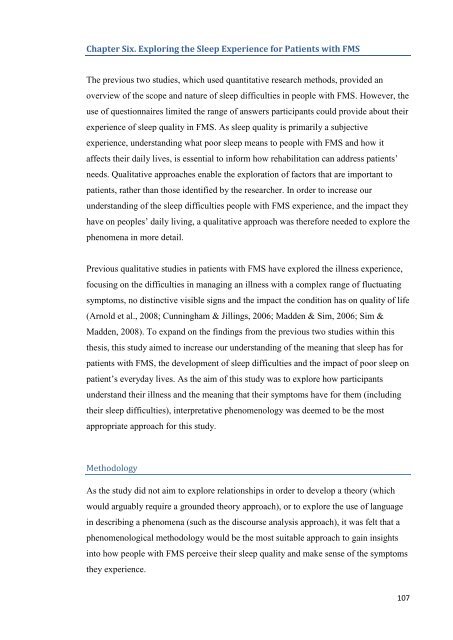Sick and Tired: Understanding and Managing Sleep Difficulties in ...
Sick and Tired: Understanding and Managing Sleep Difficulties in ...
Sick and Tired: Understanding and Managing Sleep Difficulties in ...
You also want an ePaper? Increase the reach of your titles
YUMPU automatically turns print PDFs into web optimized ePapers that Google loves.
Chapter Six. Explor<strong>in</strong>g the <strong>Sleep</strong> Experience for Patients with FMS<br />
The previous two studies, which used quantitative research methods, provided an<br />
overview of the scope <strong>and</strong> nature of sleep difficulties <strong>in</strong> people with FMS. However, the<br />
use of questionnaires limited the range of answers participants could provide about their<br />
experience of sleep quality <strong>in</strong> FMS. As sleep quality is primarily a subjective<br />
experience, underst<strong>and</strong><strong>in</strong>g what poor sleep means to people with FMS <strong>and</strong> how it<br />
affects their daily lives, is essential to <strong>in</strong>form how rehabilitation can address patients‟<br />
needs. Qualitative approaches enable the exploration of factors that are important to<br />
patients, rather than those identified by the researcher. In order to <strong>in</strong>crease our<br />
underst<strong>and</strong><strong>in</strong>g of the sleep difficulties people with FMS experience, <strong>and</strong> the impact they<br />
have on peoples‟ daily liv<strong>in</strong>g, a qualitative approach was therefore needed to explore the<br />
phenomena <strong>in</strong> more detail.<br />
Previous qualitative studies <strong>in</strong> patients with FMS have explored the illness experience,<br />
focus<strong>in</strong>g on the difficulties <strong>in</strong> manag<strong>in</strong>g an illness with a complex range of fluctuat<strong>in</strong>g<br />
symptoms, no dist<strong>in</strong>ctive visible signs <strong>and</strong> the impact the condition has on quality of life<br />
(Arnold et al., 2008; Cunn<strong>in</strong>gham & Jill<strong>in</strong>gs, 2006; Madden & Sim, 2006; Sim &<br />
Madden, 2008). To exp<strong>and</strong> on the f<strong>in</strong>d<strong>in</strong>gs from the previous two studies with<strong>in</strong> this<br />
thesis, this study aimed to <strong>in</strong>crease our underst<strong>and</strong><strong>in</strong>g of the mean<strong>in</strong>g that sleep has for<br />
patients with FMS, the development of sleep difficulties <strong>and</strong> the impact of poor sleep on<br />
patient‟s everyday lives. As the aim of this study was to explore how participants<br />
underst<strong>and</strong> their illness <strong>and</strong> the mean<strong>in</strong>g that their symptoms have for them (<strong>in</strong>clud<strong>in</strong>g<br />
their sleep difficulties), <strong>in</strong>terpretative phenomenology was deemed to be the most<br />
appropriate approach for this study.<br />
Methodology<br />
As the study did not aim to explore relationships <strong>in</strong> order to develop a theory (which<br />
would arguably require a grounded theory approach), or to explore the use of language<br />
<strong>in</strong> describ<strong>in</strong>g a phenomena (such as the discourse analysis approach), it was felt that a<br />
phenomenological methodology would be the most suitable approach to ga<strong>in</strong> <strong>in</strong>sights<br />
<strong>in</strong>to how people with FMS perceive their sleep quality <strong>and</strong> make sense of the symptoms<br />
they experience.<br />
107

















